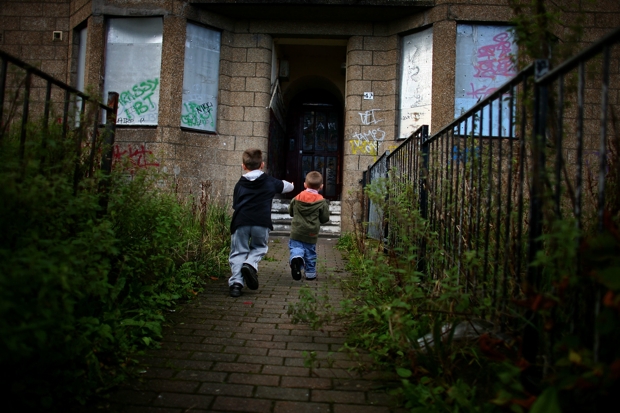It’s sad to see so many genuinely well-meaning people judge the fight against poverty by the publication of a massive spreadsheet, but that’s the trap the UK government has been caught in for years. The Child Poverty Act is about income redistribution, and success is judged by how many people are seen to be below an arbitrary threshold: 60 per cent of average income. The figures came out today, and show that the number in poverty has barely shifted – which will surprise those who thought government cuts would push poverty figures higher.
But is this really much cause to celebrate? There are still 2.3 million (17 per cent) of children in households deemed to be ‘in poverty’ – but, more importantly, this measure is pretty appalling. If a parent’s income rises by £1 a week above this poverty line, the children are deemed ‘lifted out of poverty’ – if asked, they’d be amazed to find themselves so described.
There is an urgent need to move away from narrow financial/material measures. Paradoxically, in 2012, 300,000 children had been moved out of relative income poverty largely because of a fall in the national median income. Such statistical anomalies are only one reason why veteran poverty-fighting politicians from across the spectrum agree the measures need a serious overhaul.
The myopia they induce in government action means they are ‘fatally flawed’ in the words of Alan Milburn, the Government’s Social Mobility tsar and lead to a ‘straitjacketed understanding of poverty’ according to Frank Field MP, former leader of the Child Poverty Action Group.
Iain Duncan Smith’s work in Opposition with the Centre for Social Justice led the way in forcefully arguing that the obsession with income and how much ‘stuff’ people have (the material deprivation measure) ignored the drivers of poverty: entrenched worklessness, family breakdown, problem debt, substandard education and drug and alcohol dependency. Some of the Lib Dems understood this too: David Laws was a signatory to the Coalition consultation on broadening the measures of poverty because of the need to reflect its multidimensional nature.
Children on the right side of the poverty line could be experiencing profound misery because of a parent’s mental health problems and addictions – or family breakdown. One pernicious effect of unreformed welfare was that many parents made a rational decision to live separately because they got more tax credits as a single parent. Two thirds of children in the poorest 20 per cent of society no longer live with both their parents at the age when they sit their GCSEs. Obviously the welfare system cannot be held wholly responsible but it certainly sent the wrong message.
Parents often limited the hours they worked because of tax credit cliff-edges that meant losing a swingeing level of subsidy. This week the Chancellor and Secretary of State have majored on the need to ‘restore sanity to welfare’ as part of the Prime Minister’s new and welcome One Nation emphasis. Ensuring the decisions of people needing welfare mimic those in the world of work is an important means to this end.
If the Tories really are serious about tackling poverty, they must press on with their manifesto promise to introduce ‘better measures to drive real change in children’s lives’ and tackle these root causes.
Dr Samantha Callan is Associate Director for Families and Mental Health at the Centre for Social Justice






Comments